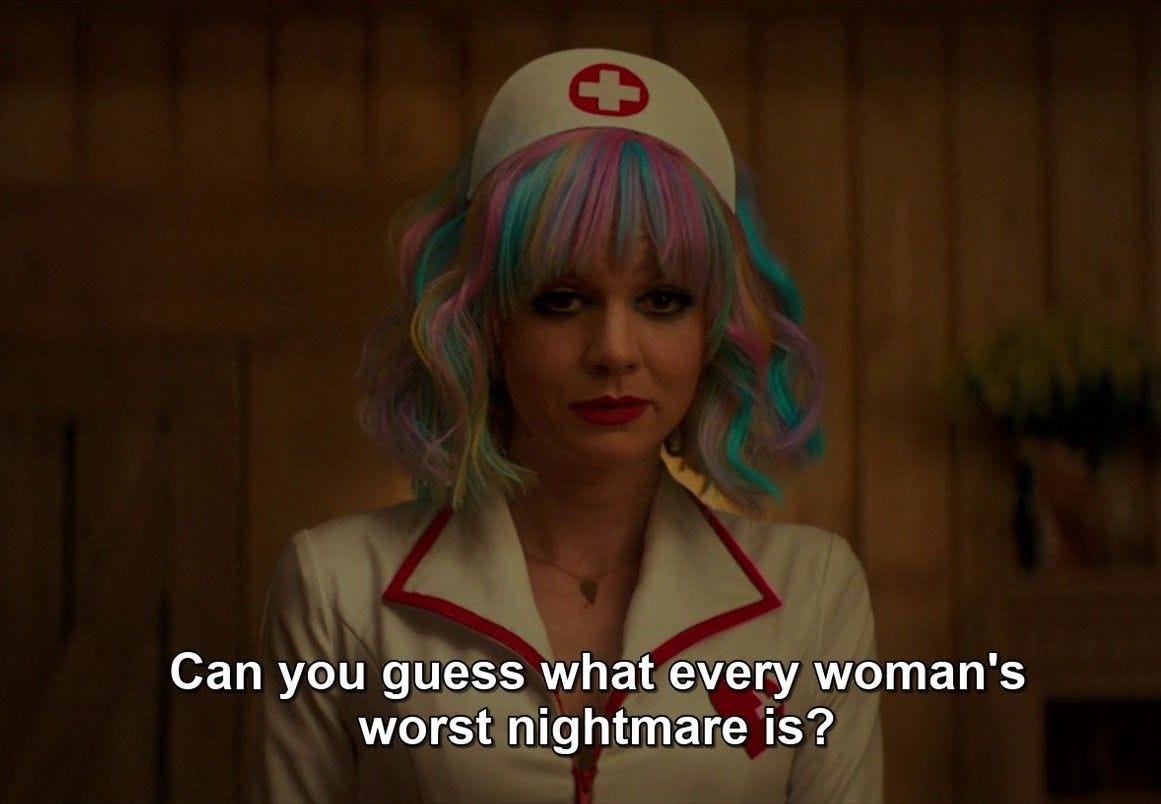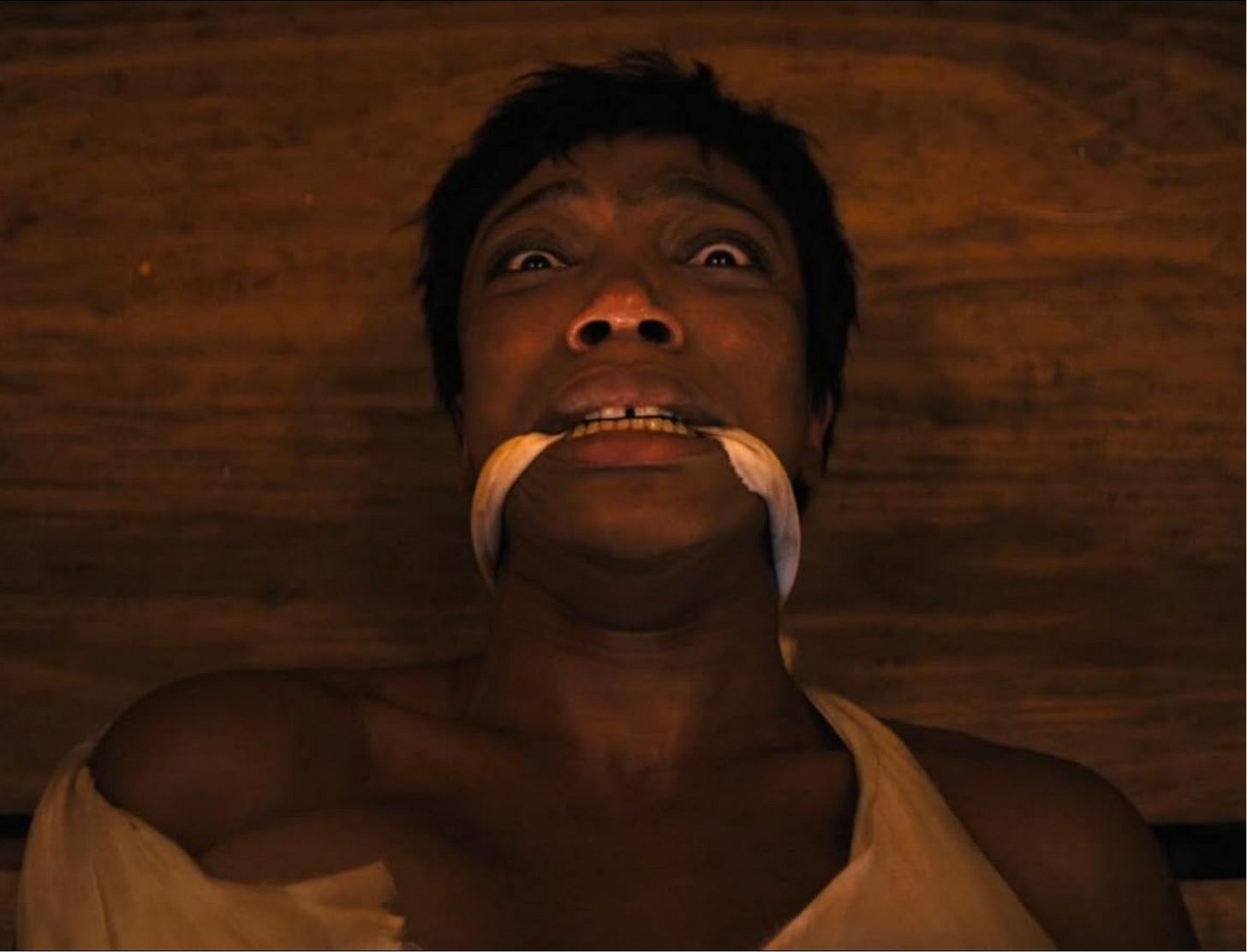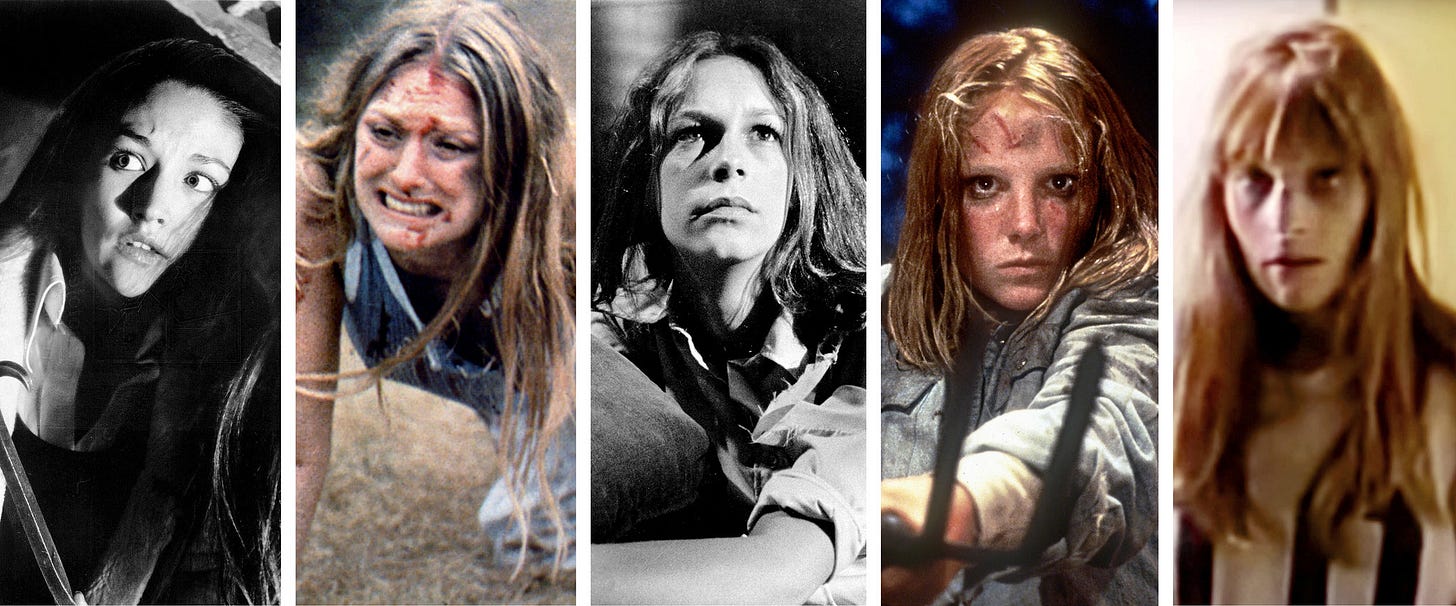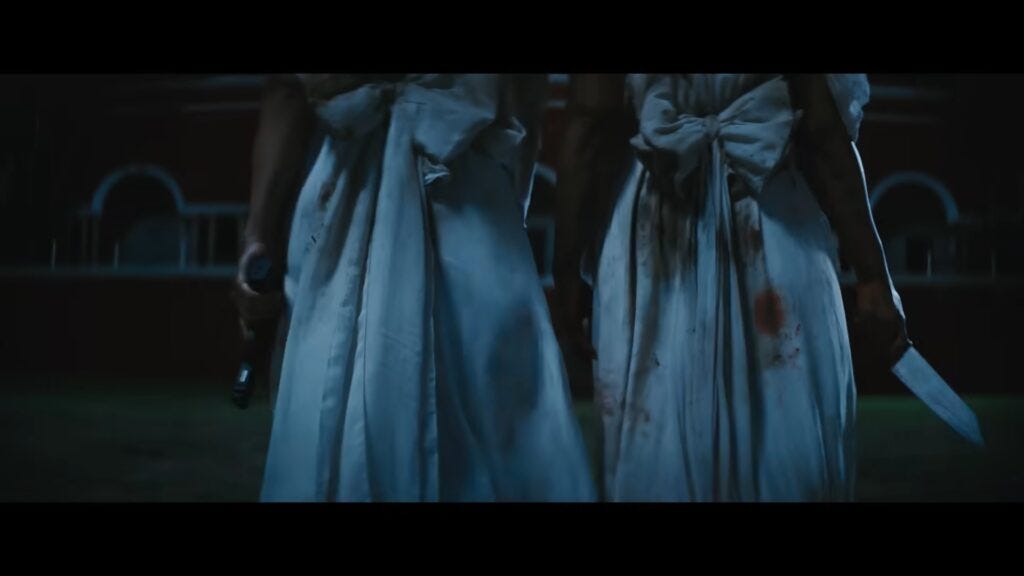sex, survival, and the death of the Final Girl
what Promising Young Woman, Don’t Worry Darling, and Blink Twice reveal about rape culture in media
Introduction
The Final Girl was a staple character trope in the slasher genre. She survived despite the odds being stacked against her and successfully evaded her captor or outright killed him. As the slasher genre dies, so does the Final Girl. Where does that leave women in horror? It leaves women in an awkward in-between space of political correctness and poor storytelling.
The Final Girl survives, but not triumphantly.
Promising Young Woman, Don’t Worry Darling and Blink Twice will be used as examples of “new age” horror films or “social thrillers,” that feature final girls who do survive the omnipresent final boss (a misogyny/sexist/racist monster,) but at the cost of their sanity. These films highlight cultural fears of denial of bodily autonomy, which has been a consistent presence since the 2016 Presidential election and the eventual overturn of Roe v. Wade.
The Final Girl survived a period of cultural fears surrounding teen promiscuity and corruption of the youth from the 1970s into the late 2000s. Many argue that she does not have a place in feminism. Still, I say that the Final Girl and her status can be used to identify where America has landed culturally on feminist topics. Horror films of the 2020s have landed here -- women must accept that they live in a patriarchal society and if they refuse, violence will be the outcome.
The media that misses the point
Promising Young Woman, a social thriller released in 2020 was the feature directorial debut of Emerald Fennell. It starred Carey Mulligan as Cassandra, a woman who lost her best friend, Nina, to suicide after she was raped in college. Cassandra works in a coffee shop and spends her nights pretending to be publicly intoxicated and threatening anyone who attempts to take advantage of her sexually.
The film was marketed as a “revenge” film, where it was implied that Cassandra was murdering the men she was taking home. In the trailer, she even keeps a tally in a journal of her encounters. By the end of the movie, Cassandra discovers that Nina’s rapist is having his bachelor party at a remote cabin in the woods. She poses as a stripper, drugs the other men attending, and manages to tie up the rapist. The audience gets a monologue about rape culture and sexual assault, which amounts to nothing because Nina’s rapist breaks free and murders Cassandra.
As we near the end of the film with no conflict resolution, it’s revealed at the wedding reception (as police come to arrest everyone involved in Cassandra’s murder) that Cassandra notified people of her whereabouts and what likely happened to her. Nina’s story starts where it began, and Cassandra loses her life as a result with no justice for either party.
Don’t Worry Darling, a social thriller released in 2022, was the “sophomore slump” of Olivia Wilde’s directing career. It starred Florence Pugh and Harry Styles as a happily married couple living in a 1950s-Palm Springs-esque community where Pugh’s character realizes something is not quite “right.”
Our female lead discovers a world-shattering secret; her husband has placed her into a simulated 1950s reality. In the real world, she’s a doctor which keeps her from taking care of her husband and the home. In the spec script, she almost breaks free from the simulated reality. She kills her husband in the simulation and the real world but passes out and wakes up again in the simulation strapped to a hospital bed. It’s 1954, so she’s promptly locked away in a psych ward until an old friend visits her and points her toward a way out. The motivations of the characters are fleshed out and less sympathetic; you actively hate the husbands from the very beginning. Her escape is also much more daring and violent; she sodomizes her husband to give herself enough time to reach the exit. The final film ending is much more ambiguous. She still murders her husband and is chased to the exit, but the screen cuts to black before confirming her escape.
Blink Twice, another social thriller released this past August marked Zoe Kravitz’s directorial debut. It’s a film about a woman named Frida and her best friend, Jess who are both invited to travel to the island of tech-billionaire Slater King. The “twist” is revealed in the second act; the women on the island are being systematically drugged and raped every night. A second twist is revealed, Frida had already been to the island once before. Chaos ensues and people die, except the main perpetrator, Slater King is allowed to walk away with his life. Frida drugs King marries him and takes over his company in the name of “revenge,” but the viewer doesn’t get to see what happens beyond that.
The cultural death of the Final Girl
A common thread throughout all three of these films is that the Final Girl doesn’t survive her ordeal triumphantly. She doesn’t sprint toward the last few minutes narrowly escaping, rather she’s knocked out cold and dragged back inside the haunted house.
In the 1970s with the burgeoning sexual revolution, the horror genre was used as a tool to remind women of the punishment that came with being a sexual being. In “Men, Women and Chainsaws” by Carol J. Clover, the Final Girl is described as, “the Girl Scout, the bookworm, the mechanic, and unlike her girlfriends, she is not sexually active.” The Final Girl doesn’t necessarily need to be a virginal damsel, but she does reject male attention in any form.
She is intelligent, resourceful, and even paranoid; she notices the things her friends seem to miss (pg. 39). In the 1970s when women were finally allowed the right to access safe and legal abortion, our media condemned the idea of the “morally loose” woman.
The audience quickly comes to understand that femininity ensures exploitation; masculinity ensures a fighting chance at survival.
In 2024, in an allegedly progressive, sexually-free cultural landscape that claims to admonish sexual predation, there has been a consistent theme in the media we consume. In the 2020s, the slasher genre has become irrelevant, and the social thriller has taken its place. Cassandra, Alice, and Frida are three beautiful women who have their sexuality displayed wantonly on screen. Cassandra uses her body and beauty to trick men into taking her home; Alice and Jack spend much of the film having non-penetrative sex in various parts of their simulated reality; and Frida desperately wants the power she assumes will come from having a relationship with Slater King. Sex is the central theme in each of these films as they highlight the power imbalances between the characters.
If Promising Young Woman had been released in the 1970s, it would have been the box office flop, I Spit on Your Grave. Promising Young Woman was intended to highlight the subtle evilness of your average drunk man in a bar.
I Spit on Your Grave violently positions the brutal rape front and center in the film. The audience understands that this is a woman that has been attacked and humiliated and she’s rising from the dead for revenge.
Promising Young Woman doesn’t explicitly say the word rape or even show the violence on screen, but once Cassandra discovers her best friend’s attack was recorded, you finally come to understand what happened as the viewer.
In Don’t Worry Darling, Alice’s entire existence in the simulated reality denies her autonomy over her life. Alice and Jack don’t have penetrative sex in the film to reinforce the idea that the “power” belongs to Alice. An argument can be made that all the sex in the film is essentially rape; Alice never consented to be in that world to begin with.
In Blink Twice, Frida craves power and obsesses over her proximity to it. Within the first few minutes of the film, she conveniently winds up in the orbit of tech-billionaire Slater King.
They share laughs, they drink, and Frida is quickly invited to a getaway on his remote island. In a not-so-shocking twist, it is revealed that Slater King and the other men on the island have been drugging and raping the women every single night that they’ve been there.
Zoe Kravitz does an excellent job at creating a level of claustrophobic terror; Frida realizes something is amiss but isn’t quite sure what and ignores it. She even goes as far as to show the violence on screen, and it is a very anxiety-inducing few seconds. Women are running away and screaming in terror but are quickly caught and dragged back.
The women finally wake up from the drug-induced haze they’ve been under, and violence erupts. Everyone dies, but Frida goes out of her way to preserve Slater’s life. The film ends in a very confusing tone, Frida has been drugging Slater, marries him, and runs his company.
All three female leads present as the archetypal Final Girl. Cassandra and Frida are both cunning, cruel women and the real version of Alice is a strong career woman.
While the Final Girl isn’t designed to be a sexual being it can be argued it is because of the time the trope debuted in. The idea of the virginal Final Girl does not hold up because America is much less conservative than it was in the 1970s and even early 2000s. The consistent ambiguity in these films leaves the audience confused about its themes, thus continuing to perpetuate rape culture.
In Promising Young Woman, the audience is told that survivors of sexual assault can only receive justice in death. The filmmakers of Don’t Worry Darling seemingly struggled to find an appropriate way to conclude the story. Rather than highlight the fear of being denied bodily autonomy, Wilde’s directing preferred to highlight the open display of female pleasure. Blink Twice is another example of a film struggling to find a way to appropriately conclude its story. The audience is told that survivors will be unaffected by their trauma if they receive a big payday in return, which was a common argument made during the height of #MeToo.
Additionally, Blink Twice was originally titled Pussy Island, which tested poorly but would have been more fitting given the plot of the film. The consensus was that the word was too inappropriate and reduced women to only their bodies (which is almost the entire point.)
Culturally, horror films have always reflected what we were most afraid of. In a Vox article from 2016, the home invasion was a consistent theme in horror. That year was a presidential election year that highlighted the fears of many white Americans and claims spouted by the Republican party; nameless, faceless people of color invading their spaces. It is an easy metaphor for the fear of foreigners.
In June 2022, the Supreme Court overturned Roe v. Wade. Since then, we have gotten horror movies, such as Blink Twice, Immaculate, The Omen and so on that exemplify this cultural fear of unwanted pregnancy and motherhood.
Where are you going, where have you been?
It will be argued that the films mentioned above are a byproduct of a post-#MeToo world and rape culture. We claim to admonish sexual predation and believe survivors, but the ending of these films suggests otherwise culturally. Promising Young Woman only seeks justice for its survivors in death. Don’t Worry Darling does not allow the audience to see justice for the sole survivor at all. We’re not even told what happens to the other women still trapped. Blink Twice walks a thin line between empowerment and subjugation.
Perhaps, there is no place for a Final Girl in our current political climate. There is no space where a woman can successfully overcome the killer in a social thriller because the killer is still at large and a being she cannot actively see. Rather, we do not allow her to harm the ones that work on behalf of the “killer,” but destroy her instead if she dares to survive.










